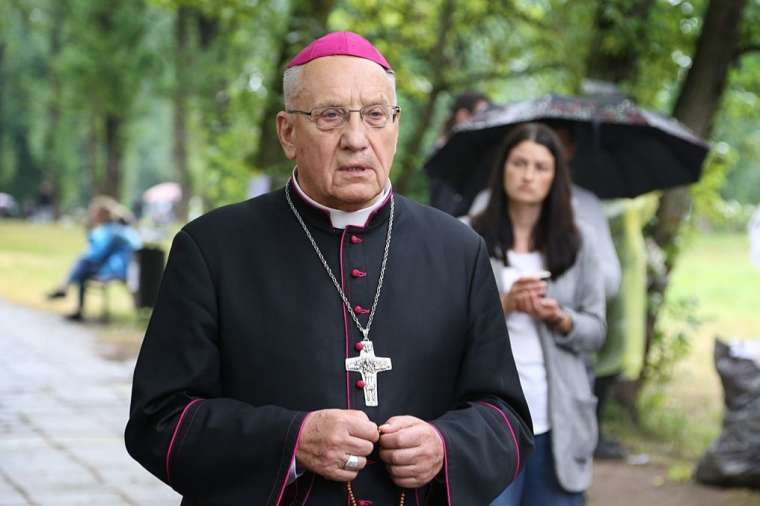Archbishop Tadeusz Kondrusiewicz of Minsk-Mohilev. Credit: Catholic.by.
A Catholic archbishop has appealed to the interior ministry of Belarus after border authorities said he was prevented from returning to his homeland because his passport was “invalid.”
Archbishop Tadeusz Kondrusiewicz wrote to the State Border Committee after he was turned back at the border 31 August while attempting to reenter Belarus following a trip to Poland.
The website of the Catholic Church in Belarus reported 14 September that the archbishop of Minsk-Mohilev received a reply last week signed by Anatoly Lappo, chairman of the border committee, stating that the archbishop was blocked “in connection with the decision made by the internal affairs bodies to invalidate the passport of a citizen of the Republic of Belarus.”
The letter continued: “You have the right to apply to the Ministry of Internal Affairs regarding the decision to declare your passport invalid.”
The state-owned news agency BelTA said that the president of the Belarusian bishops’ conference “was denied entry because his passport had been added to the list of invalid documents, which is part of the automated border control system.”
The Church website posted its report on the decision as a senior Vatican official ended a four-day visit to Belarus.
Archbishop Paul Richard Gallagher, the Vatican’s Secretary for Relations with States, met with Vladimir Makei, the Minister of Foreign Affairs, 11 September, the first day of his trip.
During the talks, Makei renewed an invitation to Pope Francis to visit the Eastern European country, which has been rocked by protests since a disputed presidential election 9 August.
Cardinal Pietro Parolin, the Vatican Secretary of State, confirmed 14 September that the Vatican had asked that the archbishop be allowed to return to his flock.
“To us, it seems this is very important,” he said, according to the news agency Zenit.
Parolin added that Belarus had expressed “great interest” in hosting a papal visit.
Kondrusiewicz travelled last weekend to Lithuania, preaching 13 September at the Marian shrine of Šiluva, at the invitation of Archbishop Kęstutis Kėvalas of Kaunas. He thanked Lithuanian Catholics for their prayers for Belarus.
The 74-year-old had spoken out in defence of protesters after Belarusian police launched a crackdown in the wake of the election and said he feared the country was heading towards civil war.
In August, he prayed outside a prison where detained protesters were reported to have been tortured. He also demanded an investigation into reports that riot police blocked the entrance to a Catholic church in the capital, Minsk.
Despite the clampdown, protests have continued across Belarus. Ten of thousands of people took to the streets last Sunday calling for the resignation of President Alexander Lukashenko, who has ruled the country with an iron hand since 1994.
Lukashenko claimed victory in the presidential election with 80% of the vote. His challenger, Sviatlana Tsikhanouskaya, complained to electoral officials after they said she had earned just 10% of votes. She then fled to Lithuania fearing imprisonment.
Writing in the Washington Post 14 September, Tsikhanouskaya said: “As the candidate of the opposition movement, I won the majority of the votes in the 9 August presidential election — based on detailed analysis of the election results by several independent groups, which managed to scrutinize voting records in a large number of precincts despite massive government fraud.”
Lukashenko visited Russian President Vladimir Putin, his closest international ally, Monday, securing a $1.5 billion loan.
After the reciting the Angelus 13 September, Pope Francis appealed to governments around the world to respect the “just aspirations” of protesters.
Bishop Alexander Yashevsky, an auxiliary bishop of Minsk-Mohilev archdiocese, noted that the pope’s appeal was relevant to Belarus, even though he did not mention any countries by name.
The pope said: “While I urge the demonstrators to present their demands peacefully, without giving in to the temptation of aggression and violence, I appeal to all those with public and governmental responsibilities to listen to the voice of their fellow citizens and to meet their just aspirations, ensuring full respect for human rights and civil liberties.”
“Finally, I invite the ecclesial communities living in such contexts, under the guidance of their Pastors, to work for dialogue, always in favour of dialogue, and in favour of reconciliation.”
Source: CNA

